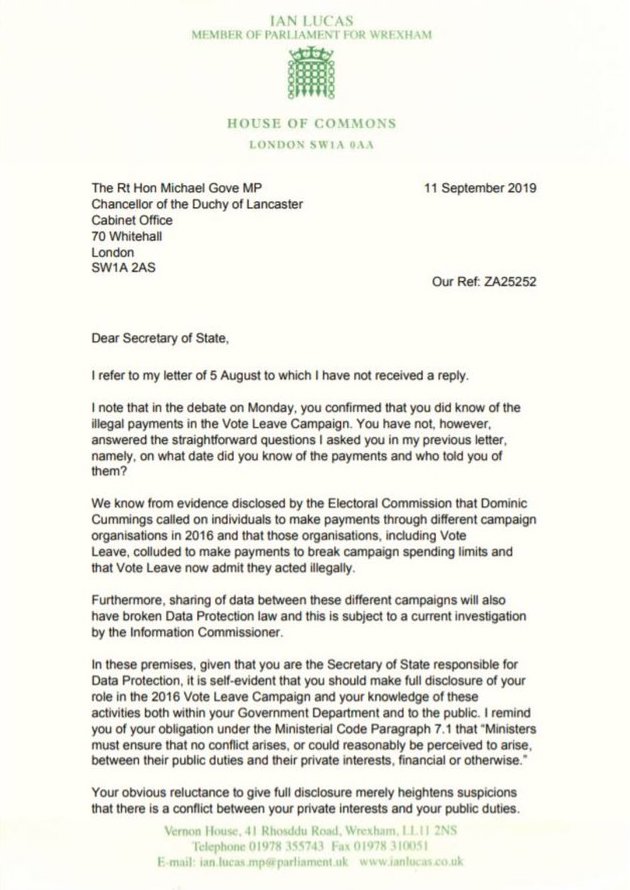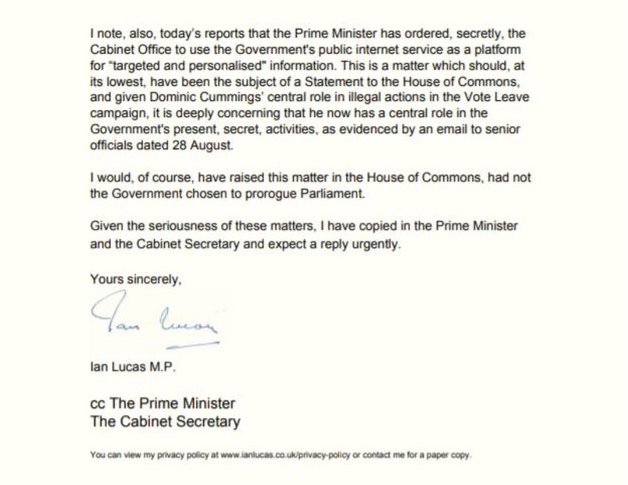
Joan Miro Montroig, la iglesia y el pueblo 1918

Ok, the mailing lists still don’t work, and now the site layout is skewed too after a WordPress update. Lovely. Apologies. Working on it.


Excellent from Declassified on how and why the Guardian started setting up vicious smear campaigns of Assange, Jeremy Corbyn and others.
• How the UK Security Services Neutralised The Guardian (Declassified)
On 20 July 2013, GCHQ officials entered The Guardian’s offices at King’s Cross in London, six weeks after the first Snowden-related article had been published. At the request of the government and security services, Guardian deputy editor Paul Johnson, along with two others, spent three hours destroying the laptops containing the Snowden documents. The Guardian staffers, according to one of the newspaper’s reporters, brought “angle-grinders, dremels – drills with revolving bits – and masks”. The reporter added, “The spy agency provided one piece of hi-tech equipment, a ‘degausser’, which destroys magnetic fields and erases data.”
Johnson claims that the destruction of the computers was “purely a symbolic act”, adding that “the government and GCHQ knew, because we had told them, that the material had been taken to the US to be shared with the New York Times. The reporting would go on. The episode hadn’t changed anything.”
Yet the episode did change something. As the D-Notice Committee minutes for November 2013 outlined: “Towards the end of July [as the computers were being destroyed], The Guardian had begun to seek and accept D-Notice advice not to publish certain highly sensitive details and since then the dialogue [with the committee] had been reasonable and improving.” The British security services had carried out more than a “symbolic act”. It was both a show of strength and a clear threat. The Guardian was then the only major newspaper that could be relied upon by whistleblowers in the US and British security bodies to receive and cover their exposures, a situation which posed a challenge to security agencies.
[..] In 2018, however, The Guardian’s attempted vilification of Assange was significantly stepped up. A new string of articles began on 18 May 2018 with one alleging Assange’s “long-standing relationship with RT”, the Russian state broadcaster. The series, which has been closely documented elsewhere, lasted for several months, consistently alleging with little or the most minimal circumstantial evidence that Assange had ties to Russia or the Kremlin. [..] The string of Guardian articles, along with the vilification and smear stories about Assange elsewhere in the British media, helped create the conditions for a deal between Ecuador, the UK and the US to expel Assange from the embassy in April.

Security Services rule the world.
• The Consequences of the Bush-Era Assault on Civil Liberties (Taibbi)
A judge last week ruled the federal government’s Terrorist Screening Database (TSDB), which secretly categorized more than 1 million people as “known or suspected terrorists,” is unconstitutional. Like a number of “War on Terror” reforms instituted in the Bush years, the TSDB’s unconstitutionality was obvious from its inception. Indeed, the very idea that we needed to “take the gloves off” in our post-9/11 “State of Exception” was an original selling point of some of these programs.
The TSDB is cousin to the No-Fly List (a different and more restrictive list ruled unconstitutional in 2014), the Distribution Matrix (the drone assassination program also known as the “Kill List”), the STELLAR WIND warrantless surveillance program, multiple expansions of the Foreign Intelligence Surveillance Act, the broadened use of National Security Letters to obtain private data without warrant, the “Enhanced Interrogation” program the rest of the world calls torture, and countless other War on Terror initiatives that were and are clear violations of the spirit of the constitution.
[..] The Kill List, the TSDB, and all the secret surveillance programs pose the same problem: they exist more or less completely apart from meaningful public oversight. They’re bureaucratic states within states. For instance, part of the PATRIOT Act governing the issue of National Security Letters (NSLs) – by which the FBI can demand that private companies turn over subscriber information, billing records, and other private data – allows the government to place gag orders on recipients of such letters. Because of this, we only have a faint idea of what NSLs look like. In one rare case, a man named Nicholas Merrill balked and sued when his company was issued a National Security Letter. In that case, the government argued that even releasing the existence of the letter would compromise national security.
This is frightening given that a) no courts need to approve the issuance of such letters, and b) the quantity of such demands is massive. Over a ten-year period, the government reportedly issued over 300,000 NSLs, at one point reaching a pace of 60,000 issued per year. The Merrill case in 2015 represented the first time a gag order was lifted on one of these operations. The recent watchlist lawsuit should remind us we’re assassinating, torturing, snooping on, and blacklisting people all over the world, by means of a continually expanding federal bureaucracy that exists outside of any specific mission, and refuses to recognize the oversight authority of courts or congress.

They’re ignoring Parliament. Risky strategy. Especially since a first court has now declared prorogation is unlawful. Before Supreme Court next week.
• No-Deal Brexit Papers Warn Of Shortages And Riots (BBC)
Riots on the streets, food price rises and reduced medical supplies are real risks of the UK leaving the EU without a deal, a government document has said. Ministers have published details of their Yellowhammer contingency plan, after MPs voted to force its release. It outlines a series of “reasonable worst case assumptions” for the impact of a no-deal Brexit on 31 October. Labour leader Jeremy Corbyn said the paper confirmed the PM “is prepared to punish those who can least afford it”.
Michael Gove, one of Boris Johnson’s senior cabinet colleagues who has been given responsibility for no-deal planning, said “revised assumptions” will be published “in due course alongside a document outlining the mitigations the government has put in place and intends to put in place”. However, ministers have blocked the release of communications between No 10 aides about Parliament’s suspension. Mr Gove said MPs’ request to see e-mails, texts and WhatsApp messages from Dominic Cummings, Boris Johnson’s chief aide, and eight other advisers in Downing Street were “unreasonable and disproportionate”. Publishing the information, he added, would “contravene the law” and “offend against basic principles of fairness”.

“Under the Ministerial Code, Government ministers must have “no actual or perceived conflicts of interest”.
• £8 Billion Bet on No Deal Crash-Out by Boris Johnson’s Leave Backers (Byline)
From the financial data publicly available, Byline Times can reveal that currently £4,563,350,000 (£4.6 billion) of aggregate short positions on a ‘no deal’ Brexit have been taken out by hedge funds that directly or indirectly bankrolled Boris Johnson’s leadership campaign. Most of these firms also donated to Vote Leave and took out short positions on the EU Referendum result. The ones which didn’t typically didn’t exist at that time but are invariably connected via directorships to companies that did. Another £3,711,000,000 (£3.7 billion) of these short positions have been taken out by firms that donated to the Vote Leave campaign, but did not donate directly to the Johnson leadership campaign.
Currently, £8,274,350,000 (£8.3 billion) of aggregate short positions has been taken out by hedge funds connected to the Prime Minister and his Vote Leave campaign, run by his advisor Dominic Cummings, on a ‘no deal’ Brexit. Does this £8 billion bet explain why the Prime Minister has said that he would rather “die in a ditch” before asking the EU for an extension? Is it the reason why Johnson is willing to defy the Benn Act that stops a ‘no deal’ Brexit? Is the £8 billion any kind of motivation to prorogue Parliament? Under the Ministerial Code, Government ministers must have “no actual or perceived conflicts of interest”. But what could be a bigger conflict of interest than those bankrolling the Prime Minister also having a vast financial interest in a catastrophe for Britain?



How big will Draghi be?
• ECB To Turn Stimulus Taps Back On To Prop Up Ailing Economy (R.)
The European Central Bank is set to unveil fresh stimulus measures on Thursday to prop up the ailing euro zone economy, but its exact moves are far from certain and a decision that underwhelms markets risks pushing up borrowing costs. With other major central banks easing monetary policy, Germany at risk of falling into recession and inflation expectations sliding, ECB President Mario Draghi has all but promised more support, putting all of the bank’s remaining tools in play. However Draghi, who hands over the leadership of the central bank to Christine Lagarde at the end of October, will face push back from more conservative members of his Governing Council.
Some policymakers have voiced concerted, public opposition to more radical stimulus measures, particularly the restarting of bond purchases, known as quantitative easing. Also, Draghi’s dovish talk has raised investors’ expectations so high that it will be difficult to fully deliver on them, leaving the ECB at risk of disappointing. This could see market interest rates increase, rather than fall. While the ECB has a wide range of policy instruments at its disposal, each comes with complications, from questionable efficacy and big side effects.

No, seriously, they have a “Commissioner for Protecting our European Way of Life”
• Ridiculous EU Commissioner Roles Show Why People Hate Brussels Bureaucracy (RT)
Ursula von der Leyen has unveiled her new team of EU Commissioners. Their job descriptions and responsibilities are nebulous, oddly overlapping and bound to cause confusion. This is European bureaucracy at its worst.
Most Europeans pay scant attention to the detailed inner workings of Brussels politics, precisely because of the bewildering nature of its bloated bureaucracy. Von der Leyen, the EU Commission President, has gone and made it worse. The former German defense minister has steered away from traditional ministerial titles and opted for more Orwellian-sounding names – the kind you need to google to decipher what they actually mean.
Instead of getting a commissioner for dealing with defense or foreign policy, for instance, we are getting a “Commissioner for a Stronger Europe in the World.” There will also be a “Commissioner for Inter-institutional Relations and Foresight” who will apparently deal with policy-making and regulation and a “Commissioner for an Economy that Works for People.” It’s all very ‘Ministry of Truth’-esque. One particular title has backfired spectacularly. The “Commissioner for Protecting our European Way of Life” will be dealing, partially, with immigration policy. The name has already been slammed as “fascist,” “grotesque” and, my favorite, an “infelicitous semantic choice” due to the alleged implication that Europeans need to be “protected” from immigrants.

Riddance. Good.
• Trump Blasts ‘Mr. Tough Guy’ Bolton (Hill)
President Trump blasted his former national security adviser John Bolton from the White House on Wednesday, saying he had been fired after making “some very big mistakes” and that he did not get along with others in the administration. In a public rebuke of a top aide that would have been extraordinary before the Trump White House, Trump said Bolton had “set us back” and that the adviser had disagreed with the president on various national security issues. He slammed a mistake Bolton made early in his tenure at the White House when he discussed a “Libyan model” in the context of North Korea — which that country took as a sign that its leadership could meet the fate of former Libyan strongman Moammar Gadhafi.
While he insisted he had gotten along with the adviser, he also ridiculed Bolton for getting the United States involved in the Iraq War. “So, John is somebody that I actually got along with very well. He made some very big mistakes,” Trump said a day after his abrupt ousting of Bolton. He said the “Libyan model” remark had set back talks with North Korea and was “not a good statement to make.” “And it set us back, and frankly he wanted to do things — not necessarily tougher than me — You know John’s known as a tough guy. He’s so tough he got us into Iraq … but he’s actually somebody I had a very good relationship with. But he wasn’t getting along with people in the administration that I consider very important.”

Bolton to spend more time with his family

What kind of job is that anyway?
• Three Bolton Aides Resign From Trump White House After His Exit (Hill)
Three aides to national security adviser John Bolton are resigning from the White House a day after news broke of Bolton’s high-profile departure from the Trump administration, Reuters reported. According to the news agency, the White House received resignations on Wednesday from the trio of staffers, who have reportedly worked with Bolton for years: Bolton’s former spokesman, Garrett Marquis; his former communications director, Sarah Tinsley; and Christine Samuelian, who served as Bolton’s scheduler. Marquis said in a statement obtained by Reuters Wednesday that “it was an honor to serve my country, and I wish the president and the administration success moving forward.”
The Hill has not yet confirmed the departures with the White House. The departures came a day after Trump announced that he had fired Bolton via Twitter, citing disagreements they had over “many of his suggestions.” “I informed John Bolton last night that his services are no longer needed at the White House. I disagreed strongly with many of his suggestions, as did others in the Administration, and therefore I asked John for his resignation, which was given to me this morning,” Trump said in a pair of tweets on Tuesday morning.

If you can’t get your money out, why invest?
• Investors Concerned Over China’s Capital Controls, Lack Of Transparency (SCMP)
China’s biggest investment fair was intended to project the image that the country is fully open for business, but instead it has been dominated by foreign firms complaining that local governments are still making it a difficult place to operate. Delegates in Xiamen this week suggested that local governments are ignoring advice from Beijing as it aims to increase market access and level the playing field with domestic companies, meaning that the implementation of reforms to make it easier for foreign firms to operate in China still have not gone far enough. As it undergoes pressures caused in the most part by the trade war with the United States, Beijing is redoubling its efforts to woo investment by lavishing promises of fair treatment on foreign investors and giving VIP treatment to the likes of Telsa CEO Elon Musk.
But capital controls that restrict the flow of money into and out of the country, as well as lack of transparency in the bidding processes involving local governments, were among specific concerns raised during a panel discussion at the annual China International Fair for Investment and Trade. “In the past, when it comes to tenders and bidding, everyone would immediately turn to the company identity. This happened very often. This is a foreign company, that is a state company and this is a private company,” said Wang Jie, vice-president of Schneider Electric China, which manufactures and distributes electrical components. “Sometimes it’s not explicit, but it would be like, ‘This is an important project, maybe it isn’t appropriate for a foreign company.’”
[..] Zhou Bing, vice-president for Dell Greater China, said that it is important to have more flexibility in cross-border capital flows to boost trade, with China currently maintaining strict controls that can effectively shut off outflows. This can prove to be a major disadvantage for overseas investors who want to know that they can transfer their money out of China after it has been invested. “We are a typical company in the processing trade business here,” said Zhou, referring to a company that imports components into China to assemble them into finished goods before being exported. “So, it means there’s massive amount of capital flowing in and out [of China]. Right now, it’s still relatively smooth, but in the long term, do we want to keep our capital in China, do we keep our profit in China? It depends on how open the policy is.”

It’s not just America, the whole world should think this over. Inequality doesn’t last.
• The Rich Can’t Get Richer Forever, Can They? (New Yorker)
In 1831, Alexis de Tocqueville, at the age of twenty-five, was sent by France’s Ministry of Justice to study the American penal system. He spent ten months in the United States, dutifully visiting prisons and meeting hundreds of people, including President Andrew Jackson and his predecessor, John Quincy Adams. On his return to France, he wrote a book about his observations, “Democracy in America,” the first volume of which was published in 1835. Many of the observations have weathered well (he noted, for instance, how American individualism coexisted with conformism). Others have not. For example, Tocqueville, who was the youngest son of a count, was deeply impressed by how equal the economic conditions in the United States were. It was, at the time, an accurate assessment.
The United States was the world’s most egalitarian society. Wages in the young nation were higher than in Europe, and land in the West was abundant and cheap. There were rich people, but they weren’t super-rich, like European aristocrats. According to “Unequal Gains: American Growth and Inequality Since 1700,” by the economic historians Peter H. Lindert and Jeffrey G. Williamson, the share of national income going to the richest one per cent of the population was more than twenty per cent in Britain but below ten per cent in America. The prevailing ideology of the country favored equality (though, to be sure, only for whites); Americans were proud that there was a relatively small gap between rich and poor. “Can any condition of society be more desirable than this?” Thomas Jefferson bragged to a friend.











